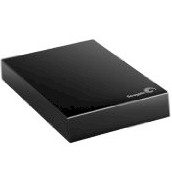 |
|
|
| ||||||
|
 |
Seagate Verbatim SSD 128GB USB 3.0 Portable External Hard Drive 47622 |
Review of the 128GB Verbatim SSD USB 3.0 Portable External Hard Drive 47622 by Seagate. (You can print this review in landscape mode, if you want a hardcopy) Reviewer: Mark Lamendola Because it's solid state, this drive can be put into a much smaller form factor than can a Winchester drive. This particular product is actually credit-card sized in its width and length dimensions. It's thicker than a credit card, because it has a standard-sized USB port in one end. For some reason, mobile phone makers decided to complicate the lives of their customers by using a mini-USB port. I believe their motivation in doing that was to keep adding fuel to the fire of "Why mobile phone customers hate their providers." So they've standardized on something that doesn't work with other systems such as one of the half-dozen USB adapters a typical user has acquired (not to mention cables and other things). So I was very pleased to see that Seagate decided not to engage in that stupidity. Seagate also chose "easy to open" packaging. What? No chain saw required? No stabbing your finger with a pen knife or breaking a pair of scissors? Yes, Seagate has packaged this product in a way that assumes customers actually want to use it. Note to aspirin-makers: Contact Seagate's consumer packaging team. I have reviewed two other Seagate drives, and was surprised that those also came in user-compatible packaging. So already, we are off to a good start before even using the product. Having looked at internal SSDs, I was surprised to see this external one doesn't require a special card or adapter to function. Note to Seagate product developers: Your Website is hard to use to find specific products, so I'm only guessing that you don't have an internal bootable drive that doesn't require a special driver card. I hate the idea of running my boot drive from a card that can fail. Getting the advantages of SSD even with the bottleneck of USB would be a big improvement over a Winchester boot drive. Unlike one of the other Seagate external drives I reviewed, this one does not require a proprietary cable. That is a huge plus. The last thing I need is yet another type of cable to keep track of and to buy a backup of in case of cable problems. Not long ago, I switched from being a long-term user of Western Digital internal drives to being a user of Seagate internal drives again. Something I do not like about either manufacturer is they include software with those drives. They need to tell you whether it's optional, rather than letting you guess and have problems if you make the wrong choice. That software just creates overhead and I don't see what purpose it serves or problem it solves. So I was happy to see this external SSD doesn't have any goofy software with it. As with the Winchester ones I reviewed, this drive is plug and play. That's almost a given, because it's USB. However, I have found some USB devices act more like plug and pray. Or maybe prey. SSD pros and cons Without going into a technical tutorial, the basic difference between a solid state drive and a Winchester drive is the SSD has no moving parts. This means it uses less energy, is instant-on, can park with data stored and ready to access (vastly reducing bootup time), has faster access times, and is likely to have a much higher run to fail time. Whereas with the Winchester drives the primary failure mode is the platters where data are stored, you don't have that degree of risk with the SSD. The most likely failure is at the USB connector. That means if the drive "fails" data recovery is probably going to be a matter of just repairing that connection rather than using forensics tools to restore lost or corrupted data.
There are two cons. The first is the cost per GB. It's much higher than that of
a Winchester drive. The other con arises from the first: these come in very
small sizes compared to Winchester drives. So they really aren't suitable for
today's data storage or backup demands. Given that networking computers with Windows 7 is so difficult as to not be worth the effort (or with "up"grading them all to W7), this drive solves file-sharing problems for things like quickly moving e-mail files and contact lists (and having them on a credit card sized drive). Forget about doing much with large files; this just doesn't have the capacity.
You can use this to back critical files, such as data files of your financial
software. If you want to carry proprietary data on a trip, you can probably
stick this drive in your wallet or even your phone case. So even if your laptop
gets stolen (and your wallet isn't in your laptop bag), you still have those
files. | |
| |||||